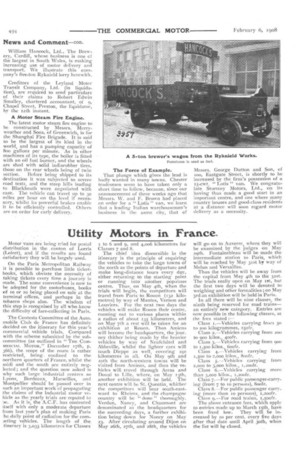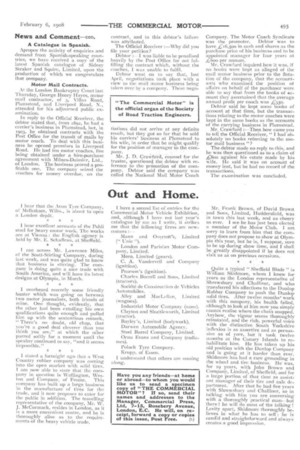Utility Motors in France.
Page 12

Page 13

If you've noticed an error in this article please click here to report it so we can fix it.
Motor vans: are being tried for postal distribution in the . canton of Lorris (Loiret), and if the results are found satisfactory they will be largely used.
On the Paris Metropolitan Railway it is possible to purchase little ticketbooks, which obviate the necessity of taking tickets every time a jourr.ley is made. The same convenience is now to he adopted for the motorbuses, books of to or 20 being placed on sale at the terminal offices, and perhaps in the tobacco shops also. The wisdom of this step is recognised by all who know the difficulty of fare-collecting in Paris.
The Contests Committee of the Automobile Club de France has definitely decided on the itinerary for this year's commercial vehicle trials. Compared with the scheme submitted by the subcommittee (as outlined in " TAR COMMERCIM, MOTOR," December 17th, p. 366), the scope of the route is rather restricted, being confined to the northern quarters of France, whilst the midi and the south are entirely neglected; and the question now asked is why such large industrial centres as Lyons, Bordeaux, Marseilles, and Montpellier should be passed over in such an important work of propagating the claims of the industrial motor vehicle as the yearly trials are reputed to As it is, the A.C.F. has contented itself with only a moderate departure from last year's plan of making Paris :he daily point of radiation for the corn)eting vehicles. The length of the .tinerary is .3,035 kilometres for Classes 1. to 6 and 9, and 4,006 kilometres for Classes 7 and 8.
The chief idea discernible in the itinerary is the principle of requiring the vehicles to take the large towns of the north as the points of departure and make long-distance tours every day, either returning to the starting point or running into another. populous centre. Thus, on May 4th, when the trials will begin, the competitors will travel .from Paris to Rouen (132 kilometres) by way of Mantes, Vernon and Louviers. For the next two days the vehicles will make Rouen their centre, running out to various places within a radius of about 135 kilometres, and on May 7th a rest will be taken for an exhibition at Rouen. Then Amiens will become the headquarters the jour_ ney thither being made by the heavier vehicles by way of Neufcithliel and Abbeville, whilst the lighter cars will touch Dieppe as well, covering tgo kilometres in all. On May gth and moth the north-western towns will be visited from Amiens, and then the vehicles will travel through Arras and Douai to Lille, where, on May t3th, another exhibition will be held, The next centre will be St. Quentin, whither the competitors will bear south-eastward to Rheims, and the champagne country will be " done " thoroughly. Verdun, Nancy, and Chaumont are denominated as the headquarters for the succeeding days, a further exhibition being down for Nancy on May 23. After circulating around Dijon on May 26th, 27th, and 28th, the vehicles will go on to Auxerre., where they will be examined by the judges on May 2 9 th . Fontainebleau will be made the intermediate station to Paris, which will be reached by May 31st by way of Melun and Versailles.
Thus the vehicles will be away from the capital from May 4th to the 31st. The trials really open on May it, but the first two days will be devoted to weighing and other formalities ; on May 3rd an exhibition will be held in Paris. In all there will be nine classes, the ninth being reserved for road trains— an entirely new category. Entries are now possible in the following classes, at the fees stated :— Class I.—Vehicles carrying from 50 to 200 kilogrammes, 25ofr. Class 2.--Vehicles carrying from zoo to goo kilos., 400fr. Class 3.—Vehicles carrying from goo to 1,5oo kilos, 600fr. Class 4.-7ehic1es carrying from 1,5oo to 2,000 kilos., 800fr. Class 5.—Vehicles carrying from 2,000 to 3,000 kilos., i,zonfr. Class 6.—Vehicles carrying more than 3,000 kilos., 1,2oofr.
Class 7.—For public passenger-carrying (from 7 to to persons), 800fr.
Class 8.—For public passenger carry_ ing (more than to persons), 1,200fr. Class 9.—For road trains, t,soofr.
The above entrance fees, which apply to entries made up to March isth, have been fixed low. They will be increased by in per cent. every five days after that date until April 3oth, when the list will be closed. A Catalogue in Spanish.
Apropos the activity of enquiries and demand from Spanish-speaking countries, we have received a copy of the latest Spanish catalogue of Sidney Straker and Squire, Limited, upon the production of which we congratulate that company.
Motor Mail Contracts.
At the London Bankruptcy Court last Thursday, George Henry Hayes, motor Mail contractor, of 3, Villas Road, Plumstead, and Liverpool Road, N., attended for his adjourned public examination.
In reply to the Official Receiver, the debtor stated that, from 1892, he had a carrier's business in Plumstead, but, in 1903, he obtained contracts with the Post Office for the transit of mails by motor coach. To deal with this business he opened premises in Liverpool Road. He had ten motor coaches, five being obtained under a hire-purchase agreement with Milnes-Daimler, Ltd., of London. The business proved a profitable one. The company seized the coaches for money overdue, on the contract, and to this debtor's failure was attributed.
The Official Receiver :—Why did you file your petition? Debtor :I was liable to be penalised heavily by the Post Office for not fulfilling the contract which, without the coaches, I was unable to fulfil.
Debtor went On to say that, last April, negotiations took place with a view to the mail motor business being taken over by a company. These nego.
tiations did not arrive at any definite result, but they got so far that he sold his carriers' business at Plumstead to his wife, in order that he might qualify for the position of manager to the company. Mr. J. D. CraWfurd, counsel for the trustee, questioned the debtor with reference to the promotion of the company. Debtor said the company was called the National Mail Motor Coach Company. The Motor Coach Syndicate was the promoter. Debtor was to have ,Ct6,5oo in cash and shares as the purchase price of his business and to be appointed manager for four years at ,t;E•oo per annum. Mr. Crawfurd inquired how it was, if no books were kept as alleged of the mail motor business prior to the flota tion of the company, that the account ants who examined the position of affairs on behalf of the purchaser were
able to say -that • from the books of eccount they ascertained that the average annual profit per coach was ,4:350.
Debtor said he kept some books of account at that time, but the transac tions relating to the motor coaches were kept in the same books as the accounts of the carrying business in Plumstead. . Mr., crawfurd :--Then how came you to tell the Official Receiver, " I had absolutely no books referring to the motor mail business "?
The debtor made no reply to. this, and he was then questioned as to a claim of ,Soo against his estate made by his wife. He said it was on account of money lent, but he had no record of the transactions.
The examination was concluded.


















